Prince Setna and the Magic Book of Thoth
Prince Setna and the Magic Book of Thoth
Procursus:
This is a very late story, existing only in a Demotic-script manuscript probably copied during the period of the Greek Ptolemaic kings (the “XXXIInd” dynasty) somewhere after 305 BC. The action is set a thousand years earlier, under the great pharaoh Ramesses II (XIXth dynasty), but that setting was either mere romanticism or an inaccurately understood historical tradition, for the writer of the existing copy of the story seems to have imagined the capital to have been at Memphis (one of the Ptolemaic capitals) rather than at Thebes, where Ramesses really had his capital, and the author gives far more attention to the god Ptah than would have been appropriate for a story from the time of Ramesses. Some Greek names also point to the Ptolemaic copyist’s (or author’s) lack of attention to historical accuracy in the setting of the tale.
This version of the story has been modified from an 1899 rendering by W. M. Flinders Petrie, preserving the original pictures. The full two-volume work, unchanged, is available to the public elsewhere on this web site. (Link)
Petrie proposed the division into theatrical “acts,” also suggesting the possibility that Act II could well have originated as a separate story sucked into this one as a “tale within the tale.” Act IV could also be imagined to stand alone, suggesting that we are dealing with a late composite seeking to combine several earlier stories. The MS is damaged, and Petrie supplied a reconstructed first “act” based on information implied in the remainder of the story. Because the story is long, the fourth “act” is merely summarized here.
—DKJ
Dramatis Personae
- Ramesses II (User-maat-ra) (reigned 1279-1212) = Egypt's greatest pharaoh (often spelled Ramses)
- Setna = his son, a disturbingly bookish lad
- Anhe-hore-ru = another son of Ramesses, the admiring brother of Setna, not very bookish at all
- Mer-neb-ptah = a long dead pharoah, possibly Amenhotep III (reigned 1386-1349).
- Na-nefer-ka-ptah = his son, also long dead, even more bookish than Setna, buried with the Magic Book of Thoth
- Ahura = Naneferkaptah's wise sister and wife, buried far away
- Merab = their little son, buried with Ahura
- Nisi-ptah = a priest of the god Ptah, also long dead
- Tabubua = an enchantress who may or may not be dead, or even imaginary
Index of Acts
Act I Setna Meets Two Ghosts
Act II Ahura's Tale
Act III Setna Struggles to Have the Magical Book of Thoth
Act IV Setna, Victorious, Becomes Bewitched
Act V Setna Makes Restitution
Act I: Setna Meets Two Ghosts
The mighty King Ramesses had a son named Setna, who was a great scribe, and very learned in all the ancient writings. And he heard that the Magic Book of Thoth, by which a man may enchant heaven and earth, and know the language of all birds and beasts, was buried in the cemetery of Memphis. And so he went to search for it with his brother Anhehoreru; and when they found the tomb of the king's son, Naneferkaptah, son of the king of Upper and Lower Egypt, Mernebptah, Setna opened it and went in.
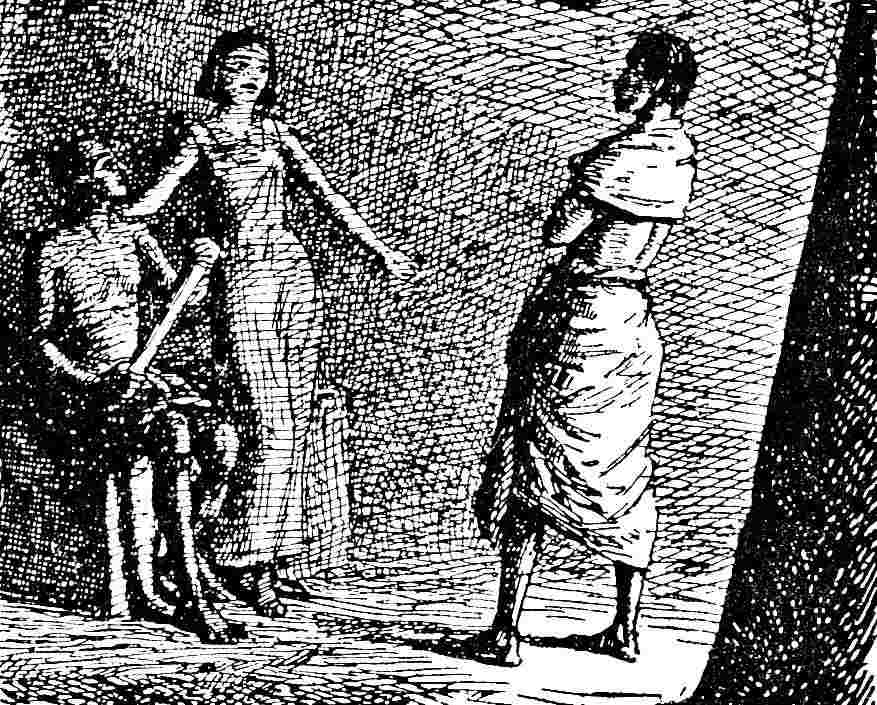
Now in the tomb was Naneferkaptah, and with him was the ka [soul] of his wife Ahura; for although she was buried at Koptos, her ka dwelt at Memphis with her husband, whom she loved.
Setna saw them seated before their offerings, and the book lay between them.
Naneferkaptah said to Setna, "Who are you that break into my tomb in this way?"
He said, "I am Setna, son of the great King Ramesses, living for ever, and I come for that book which I see between you."
Naneferkaptah said, "It cannot be given to you."
Then said Setna, "But I will carry it away by force."
Then Ahura said to Setna, "Do not take this book; for it will bring trouble on you, as it has upon us. Listen to what we have suffered for it."
Act II: Ahura's Tale
"We were the two children of the King Mernebptah, and he loved us very much, for he had no others; and Naneferkaptah was in his palace as heir over all the land.
"When we were grown, the king said to the queen, 'I will marry Naneferkaptah to the daughter of a general, and Ahura to the son of another general.'
"But the queen said, 'No, he is the heir, let him marry his sister, like the heir of a king, for none other is fit for him.'
"And the king said, 'That is not fair; it would be better if they were married to the children of the general.'
"And the queen said, 'It is you who are not dealing rightly with me.'
"And the king answered, 'If I have no more than these two children, is it right that they should marry one another? I will marry Naneferkaptah to the daughter of an officer, and Ahura to the son of another officer. It has often been done so in our family.'
"And at a time, when there was a great feast before the king, they came to fetch me to the feast. And I was very troubled, and did not behave as I used to do.
"And the king said to me, 'Ahura, have you sent some one to me about this sorry matter, saying, "Let me be married to my elder brother"? '
"I said to him, 'Well, let me marry the son of an officer, and he marry the daughter of another officer, as it often happens so in our family.' I laughed, and the king laughed.
"And the king told the steward of the palace, 'Let them take Ahura to the house of Naneferkaptah tonight, to do all kinds of good things with her.'
"So they brought me as a wife to the house of Naneferkaptah; and the king ordered them to give me presents of silver and gold, and things from the palace.
"And Naneferkaptah passed a happy time with me, and received all the presents from the palace; and we loved one another. And when I expected a child, they told the king, and he was most heartily glad; and he sent me many things, and a present of the best silver and gold and linen. And when the time came, I bore this little child that is before you. And they gave him the name of Merab, and registered him in the book of the 'House of life.'
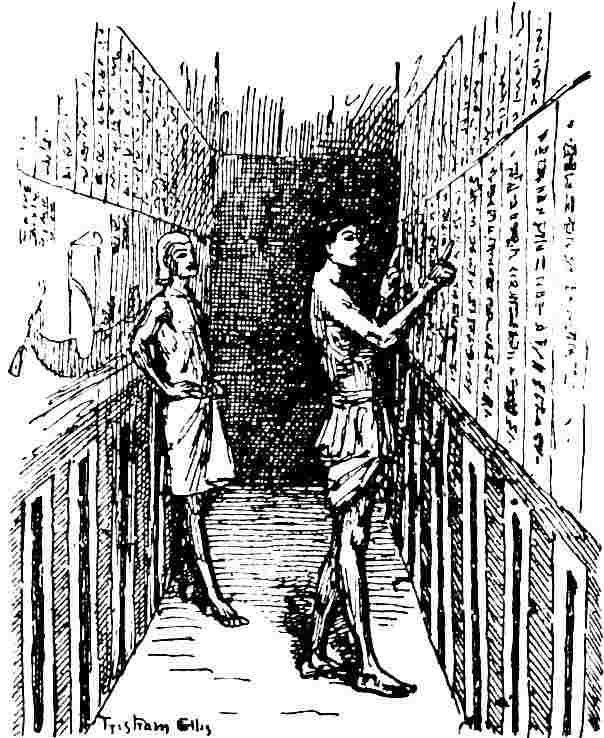
"And when my brother Naneferkaptah went to the cemetery of Memphis, he did nothing on earth but read the writings that are in the catacombs of the kings, and the tablets of the 'House of life,' and the inscriptions that are seen on the monuments, and he worked hard on the writings.
"Now there was a priest there called Nesi-ptah; and as Naneferkaptah went into a temple to pray, it happened that he went behind this priest, and was reading the inscriptions that were on the chapels of the gods. And the priest mocked him and laughed. So Naneferkaptah said to him, 'Why are you laughing at me?'
"And Nisiptah replied, 'I was not laughing at you, or if I happened to do so, it was because you are reading writings that are worthless. If you wish so much to read writings, come to me, and I will bring you to the place where the book is which [the god] Thoth himself wrote with his own hand, and which will bring you to the gods. When you read but two pages in this you will enchant the heaven, the earth, the abyss, the mountains, and the sea; you shall know what the birds of the sky and the crawling things are saying; you shall see the fishes of the deep, for a divine power is there to bring them up out of the depth. And when you read the second page, if you are in the world of ghosts, you will become again in the shape you were in on earth. You will see the sun shining in the sky, with all the gods, and the full moon.'
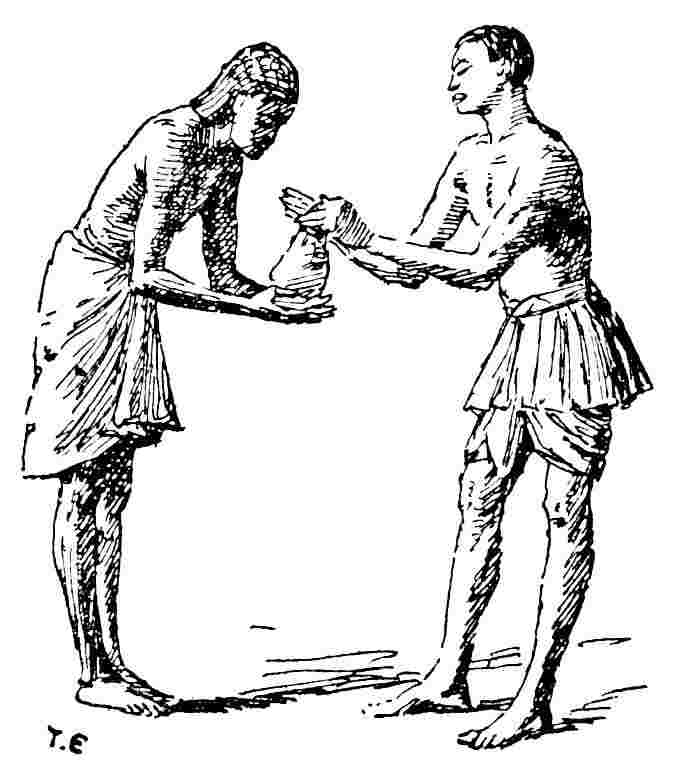
"And Naneferkaptah said, 'By the life of the king! Tell me of anything you want done and I'll do it for you, if you will only send me where this book is.'
"And the priest answered Naneferkaptah, 'If you want to go to the place where the book is, you must give me a hundred pieces of silver for my funeral, and provide that they shall bury me as a rich priest.'
"So Naneferkaptah called his lad and told him to give the priest a hundred pieces of silver; and he made them do as he wished, even everything that he asked for. Then the priest said to Naneferkaptah, 'This book is in the middle of the river at Koptos, in an iron box; in the iron box is a bronze box; in the bronze box is a sycamore box; in the sycamore box is an ivory and ebony box; in the ivory and ebony box is a silver box; in the silver box is a golden box, and in that is the book. It is twisted all round with snakes and scorpions and all the other crawling things around the box in which the book is; and there is a deathless snake by the box.'
"And when the priest told Naneferkaptah, he did not know where on earth he was, because he was so delighted.
"And when he came from the temple he told me all that had happened to him. And he said, 'I shall go to Koptos, for I must fetch this book; I will not stay any longer in the north.'
"And I said, 'Let me dissuade you, for you prepare sorrow and you will bring me into trouble in the Thebaid.' And I laid my hand on Naneferkaptah, to keep him from going to Koptos, but he would not listen to me; and he went to the king, and told the king all that the priest had said.
"The king asked him, 'What is it that you want?' and he replied, 'Let them give me the royal boat with its belongings, for I will go to the south with Ahura and her little boy Merab, and fetch this book without delay.'
"So they gave him the royal boat with its belongings, and we went with him to the harbor, and sailed from there up to Koptos.
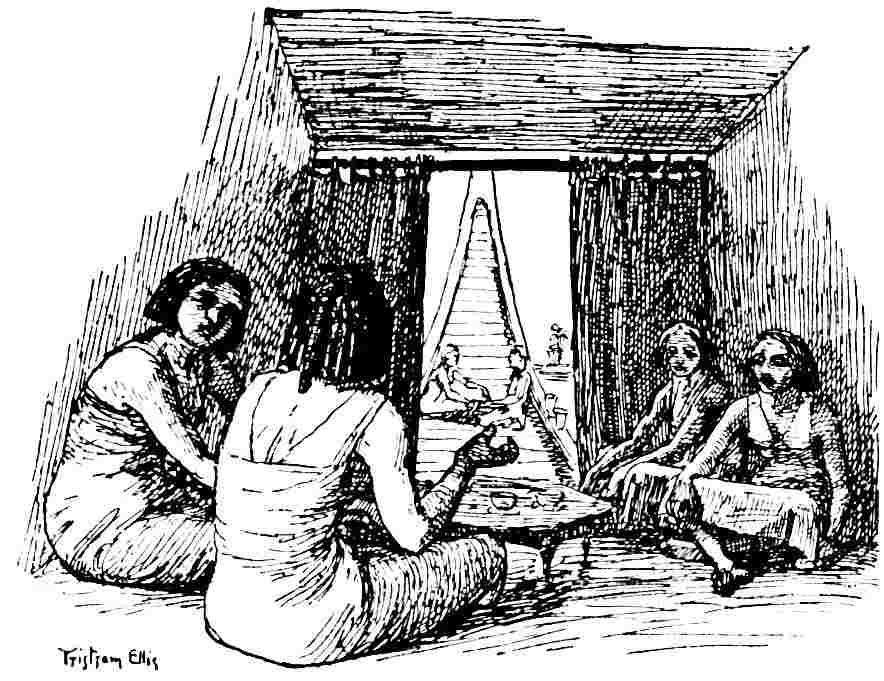
"Then the priests of Isis of Koptos, and the high priest of Isis, came down to us without waiting, to meet Naneferkaptah, and their wives also came to me. We went into the temple of Isis and Harpokrates; and Naneferkaptah brought an ox, a goose, and some wine, and made a burnt-offering and a drink-offering before Isis of Koptos and Harpokrates. They brought us to a very fine house, with all good things; and Naneferkaptah spent four days there and feasted with the priests of Isis of Koptos, and the wives of the priests of Isis also made holiday with me.
"And the morning of the fifth day came; and Naneferkaptah called a priest to him, and made a magic cabin that was full of men and tackle. He put the spell upon it, and put life in it, and gave them breath, and sank it in the water. He filled the royal boat with sand, and took leave of me, and sailed from the harbor: and I sat by the river at Koptos that I might see what would become of him.
"And he said, 'Workmen, work for me, even at the place where the book is.'
"And they toiled by night and by day; and when they had reached it in three days, he threw the sand out, and made a shoal in the river. And then he found on it entwined serpents and scorpions and all kinds of crawling things around the box in which the book was; and by it he found a deathless snake around the box. And he laid the spell upon the entwined serpents and scorpions and all kinds of crawling things which were around the box, that they should not come out. And he went to the deathless snake, and fought with him, and killed him; but he came to life again, and took a new form. He then fought again with him a second time; but he came to life again, and took a third form. He then cut him in two parts, and put sand between the parts, that he should not appear again.
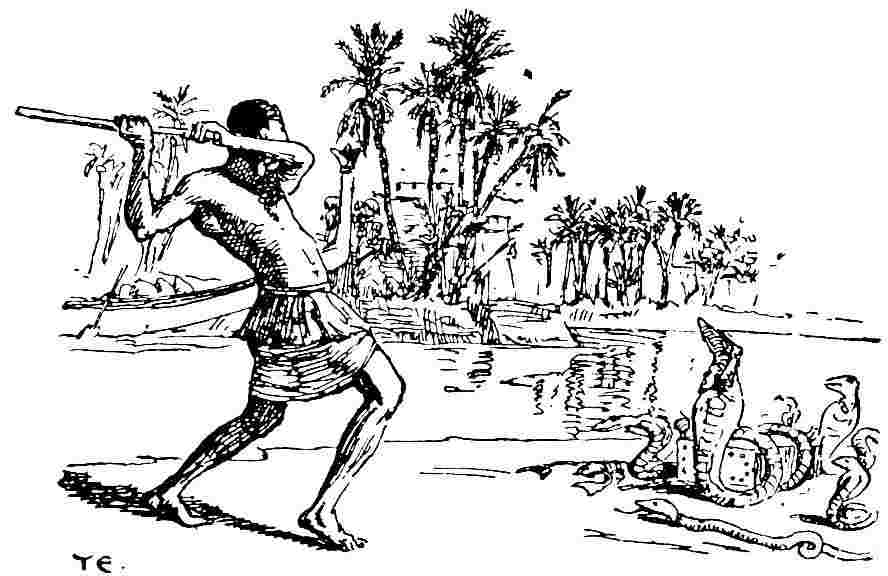
"Naneferkaptah then went to the place where he found the box. He uncovered a box of iron, and opened it; he found then a box of bronze, and opened that; then he found a box of sycamore wood, and opened that; again, he found a box of ivory and ebony, and opened that; yet, he found a box of silver, and opened that; and then he found a box of gold; he opened that, and found the book in it.
"He took the book from the golden box, and read a page of spells from it. He enchanted the heaven and the earth, the abyss, the mountains, and the sea; he knew what the birds of the sky, the fish of the deep, and the beasts of the hills all said. He read another page of the spells, and saw the sun shining in the sky, with all the gods, the full moon, and the stars in their shapes; he saw the fishes of the deep, for a divine power was present that brought them up from the water. He then read the spell upon the workmen that he had made, and taken from the harbor, and said to them, 'Work for me, back to the place from which I came.'
"And they toiled night and day, and so he came back to the place where I sat by the river of Koptos; I had not drunk nor eaten anything, and had done nothing on earth, but sat like one who is gone to the grave.
"I then told Naneferkaptah that I wished to see this book, for which we had taken so much trouble. He gave the book into my hands; and when I read a page of the spells in it I also enchanted heaven and earth, the abyss, the mountains, and the sea; I also knew what the birds of the sky, the fishes of the deep, and the beasts of the hills all said. I read another page of the spells, and I saw the sun shining in the sky with all the gods, the full moon, and the stars in their shapes; I saw the fishes of the deep, for a divine power was present that brought them up from the water.
"As I could not write, I asked Naneferkaptah, who was a good writer, and a very learned one; he called for a new piece of papyrus, and wrote on it all that was in the book before him. He dipped it in beer, and washed it off in the liquid; for he knew that if it were washed off, and he drank it, he would know all that there was in the writing.
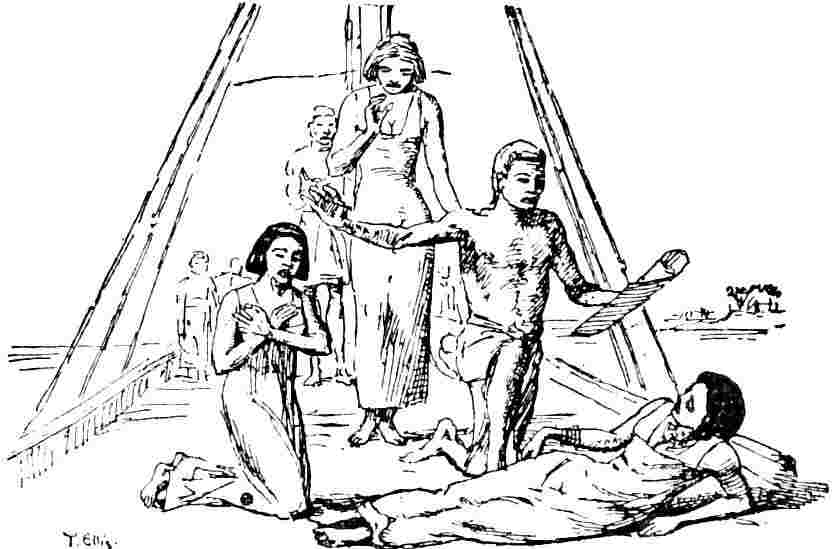
"We returned back to Koptos the same day, and made a feast before Isis of Koptos and Harpokrates. We then went to the harbor and sailed, and went northward of Koptos.
"And as we went on Thoth discovered all that Naneferkaptah had done with the book; and Thoth hastened to tell Ra, and said, 'Now know that my book and my revelation are with Naneferkaptah, son of the King Mernebptah. He has forced himself into my place, and robbed it, and seized my box with the writings, and killed my guards who protected it.'
"And Ra replied to him, 'He is before you, take him and all his kin.' He sent a power from heaven with the command, 'Do not let Naneferkaptah return safe to Memphis with all his kin.'
"And after this hour, the little boy Merab, going out from the awning of the royal boat, fell into the river: he called on Ra, and everybody who was on the bank raised a cry. Naneferkaptah went out of the cabin, and read the spell over him; he brought his body up because a divine power brought him to the surface. He read another spell over him, and made him tell of all what happened to him, and of what Thoth had said before Ra.
"We turned back with him to Koptos. We brought him to the Good House, we fetched the people to him, and made one embalm him; and we buried him in his coffin in the cemetery of Koptos like a great and noble person.
"And Naneferkaptah, my brother, said, 'Let us go down, let us not delay, for the king has not yet heard of what has happened to him, and his heart will be sad about it.' So we went to the harbor, we sailed, and did not stay to the north of Koptos. When we had come to the place where the little boy Merab had fallen in the water, I went out from the awning of the royal boat, and I fell into the river. They called Naneferkaptah, and he came out from the cabin of the royal boat; he read a spell over me, and brought my body up, because a divine power brought me to the surface. He drew me out, and read the spell over me, and made me tell him of all that had happened to me, and of what Thoth had said before Ra.
"Then he turned back with me to Koptos, he brought me to the Good House, he fetched the people to me, and made one embalm me, as great and noble people are buried, and laid me in the tomb where Merab my young child was.
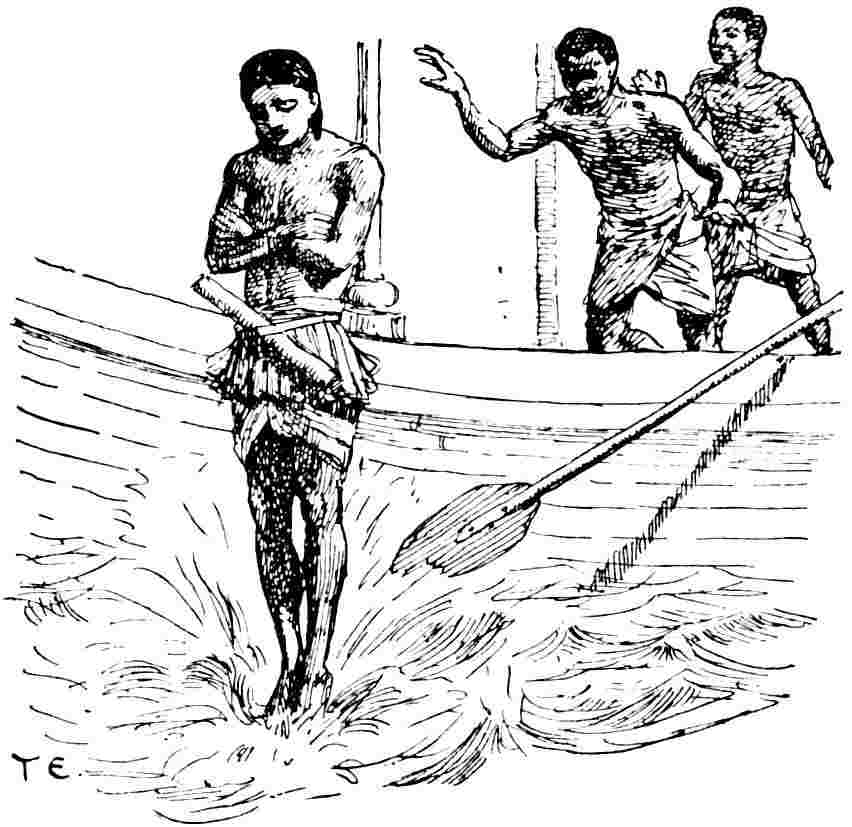
"He turned to the harbor, and sailed down, and delayed not in the north of Koptos. When he had come to the place where we fell into the river, he said to his heart, 'Shall I not do better to turn back again to Koptos, that I may lie by them? For, if not, when I go down to Memphis, and the king asks after his children, what shall I say to him? Can I tell him, "I have taken your children to the Thebaid, and killed them, while I remained alive, and I have come to Memphis still alive"?'
"Then he made them bring him a linen cloth of striped byssus; he made a band, and bound the book firmly, and tied it upon him. Naneferkaptah then went out of the awning of the royal boat and fell into the river. He cried on Ra; and all those who were on the bank made an outcry, saying, 'Great woe! Sad woe! Is he lost, that good scribe and able man that has no equal?'
"The royal boat went on, without any one on earth knowing where Naneferkaptah was. It went on to Memphis, and they told all this to the king. Then the king went down to the royal boat in mourning, and all the soldiers and high priests and priests of Ptah were in mourning, and all the officials and courtiers.
"And when he saw Naneferkaptah, who was in the inner cabin of the royal boat—from his rank of high scribe—he lifted him up. And they saw the book by him; and the king said, 'Let one hide this book that is with him.' And the officers of the king, the priests of Ptah, and the high priest of Ptah, said to the king, 'Our Lord, may the king live as long as the sun! Naneferkaptah was a good scribe, and a very skilful man.'
"And the king had him laid in his Good House to the sixteenth day, and then had him wrapped to the thirty-fifth day, and laid him out to the seventieth day, and then had him put in his grave in his resting-place.
"I have now told you the sorrow which has come upon us because of this book for which you ask, saying, 'Let it be given to me.' You have no claim to it; and, indeed, for the sake of it, we have given up our life on earth."
Act III: Setna Struggles to Have the Magical Book of Thoth
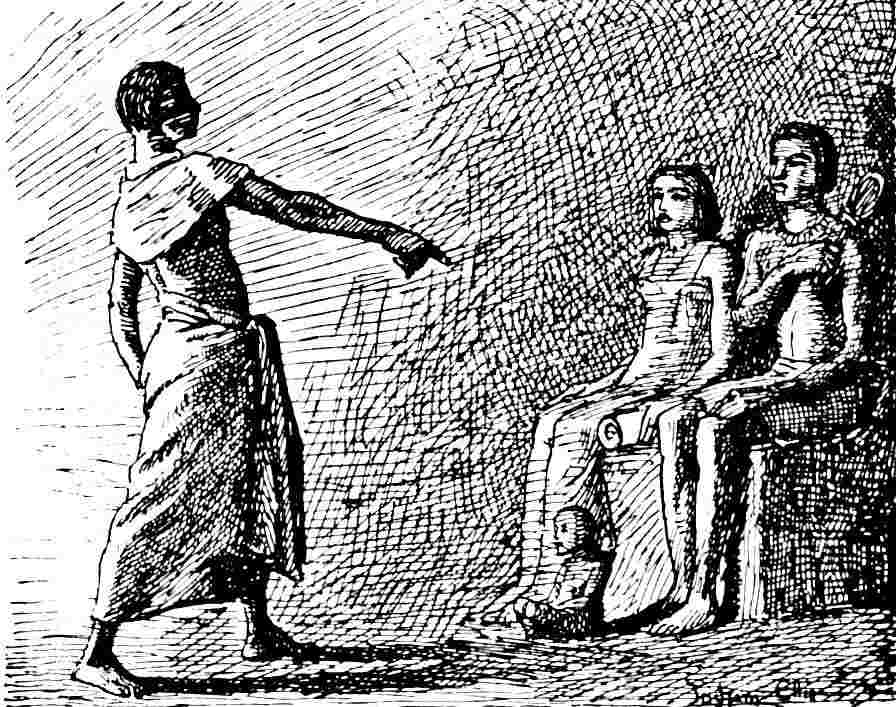
And Setna said to Ahura, "Give me the book which I see between you and Naneferkaptah; for if you do not I will take it by force."
Then Naneferkaptah rose from his seat and said, "Are you Setna, to whom my wife has told of all these blows of fate, which you have not suffered? Can you take this book by your skill as a good scribe? If, indeed, you can play games with me, let us play a game, then, of 52 points."
And Setna said, "I am ready," and the game board and its pieces were put before him. And Naneferkaptah won a game from Setna; and he put the spell upon him, and defended himself with the game board that was before him, and sunk him into the ground above his feet. He did the same at the second game, and won it from Setna, and sunk him into the ground to his waist.
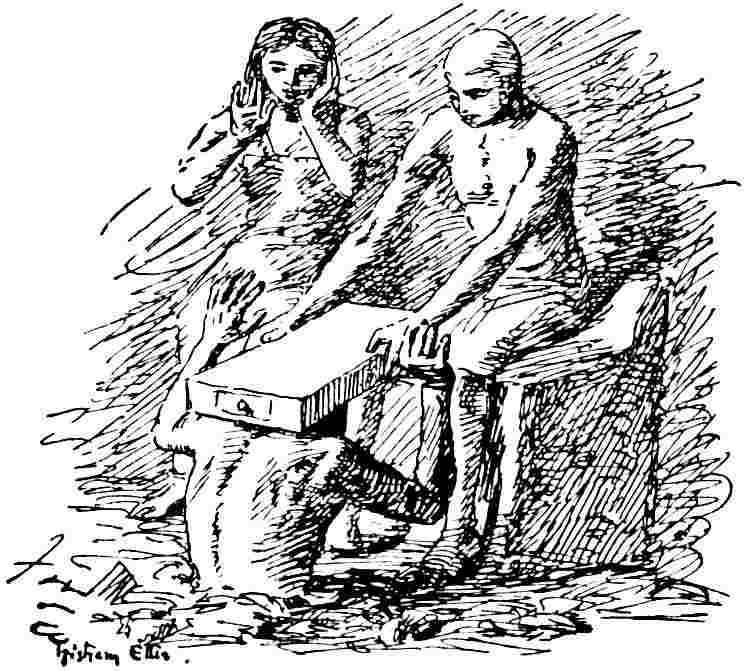
He did the same at the third game, and made him sink into the ground up to his ears. Then Setna struck Naneferkaptah a great blow with his hand. And Setna called his brother Anhehoreru and said to him,
"Make haste and go up upon earth, and tell the king all that has happened to me, and bring me the talisman of my father Ptah, and my magic books."
And Anhehoreru hurried up upon earth, and told the king all that had happened to Setna.
The king sighed and said, "Bring him the talisman of his father Ptah, and his magic books."
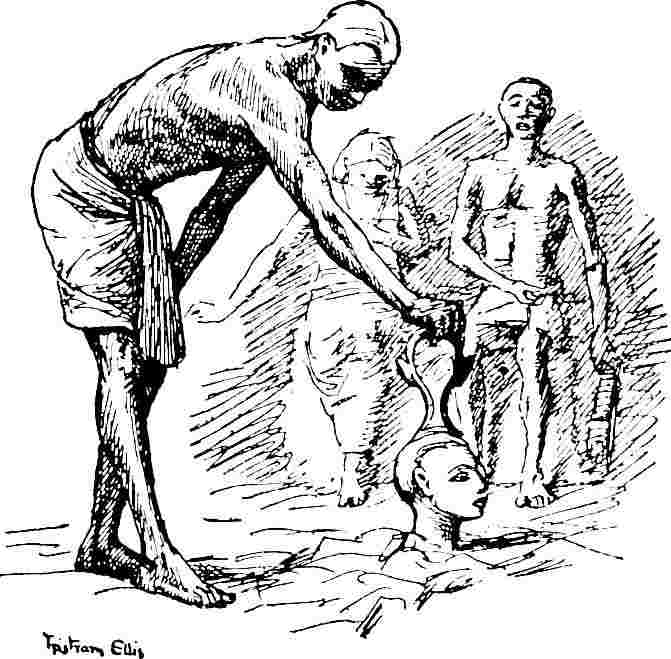
And Anhehoreru hurried down into the tomb; he laid the talisman on Setna, and he sprang up out of the ground again immediately. And then Setna reached out his hand for the book, and took it. Then —as Setna went out from the tomb— there went a light before him, and darkness behind him.
And Ahura wept at him, and she said, "Glory to the King of Darkness! Hail to the King of Light! All power is gone from the tomb."
But Naneferkaptah said to Ahura, "Do not let your heart be sad; I will make him bring back this book, with a forked stick in his hand, and a fire-pan on his head."
Act IV: Setna, Victorious, Becomes Bewitched
And Setna went out from the tomb, and it closed behind him as it was before.
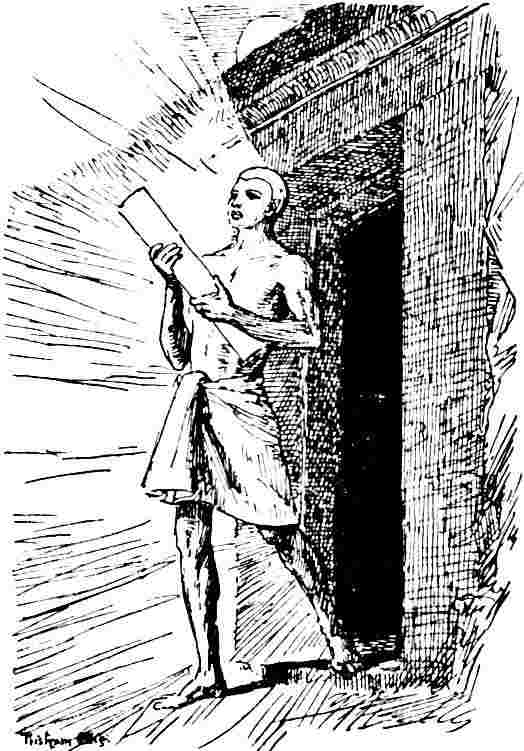
Then Setna went to the king, and told him everything that had happened to him with the book.
And the king said to Setna, "Take back the book to the grave of Naneferkaptah, like a prudent man, or else he will make you bring it with a forked stick in your hand, and a fire-pan on your head."
But Setna would not listen to him; and when Setna had unrolled the book he did nothing on earth but read it to everybody.
[Here follows a story of how Setna, walking in the court of the temple of Ptah, meets Tabubua, a fascinating girl, daughter of Ankhtaui, a priest of the goddess Bast. She entices him but also repels his advances, until she has beguiled him into giving up all his possessions, and slaying his children. At the last she gives a fearful cry and vanishes, leaving Setna bereft of even his clothes.
This would seem to be merely a dream, as evidenced by the disappearance of Tabubua, and by Setna finding his children alive after it all. But on the other hand he comes to his senses in an unknown place, and is so terrified that he is quite ready to make restitution to Naneferkaptah.]
Act V: Setna Makes Restitution
So Setna went to Memphis, and embraced his children for that they were alive. And the king said to him, "Were you not drunk to do so?"
Then Setna told all things that had happened with Tabubua and Naneferkaptah.
And the king said, "Setna, I have already warned you before, and said, 'He will kill you if you do not take back the book to the place you took it from.' But you have never listened to me till this hour. Now, then, take the book to Naneferkaptah, with a forked stick in your hand, and a fire-pan on your head."
So Setna went out from before the king, with a forked stick in his hand, and a fire-pan on his head. He went down to the tomb in which was Naneferkaptah.
And Ahura said to him, "It is Ptah, the great god, that has brought you back safe."
Naneferkaptah laughed, and he said, "This is the business that I told you before."
And when Setna had praised Naneferkaptah, he found it as the proverb says, "The sun was in the whole tomb."
Suddenly Ahura and Naneferkaptah besought Setna greatly to do a favor for them.
And Setna said, "Naneferkaptah, is it aught disgraceful (that you lay on me to do)?"
Naneferkaptah said, "Setna, you know this. Ahura and Merab, her child, are in Koptos; bring their bodies here into this tomb, by the skill of a good scribe. Let it be impressed upon you to take pains, and to go to Koptos to bring them here."
Setna then went out from the tomb to the king, and told the king what Naneferkaptah had asked him to do.
King Ramesses said, "Setna, go to Koptos and bring back Ahura and Merab."
He answered the king, "Let one give me the royal boat and its belongings." And they gave him the royal boat and its belongings, and he left the harbor, and sailed without stopping till he came to Koptos.
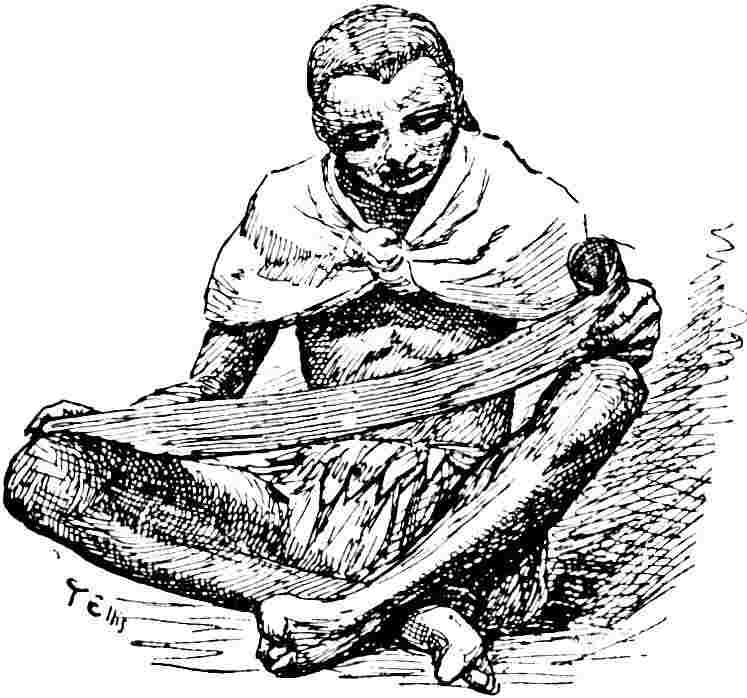
There he made this known to the priests of Isis at Koptos and to the high priest of Isis; and behold they came down to him, and gave him their hand to the shore. He went up with them and entered into the temple of Isis of Koptos and of Harpokrates. He ordered servants to offer for him an ox, a goose, and some wine, and he made a burnt-offering and a drink-offering before Isis of Koptos and Harpokrates. Then he went to the cemetery of Koptos with the priests of Isis and the high priest of Isis.
They dug about for three days and three nights, for they searched even in all the catacombs which were in the cemetery of Koptos; they turned over the fallen stelae of the scribes of the "Double House of Life," and read the inscriptions that they found on them. But they could not find the resting-place of Ahura and Merab.
Now Naneferkaptah perceived that they could not find the resting-place of Ahura and her child Merab. So he raised himself up as a venerable, very old, ancient person, and appeared before Setna. And Setna saw him, and Setna said to the ancient person, "You look like a very old man, do you know where is the resting-place of Ahura and her child Merab?"
The ancient said to Setna, "It was told by the father of the father of my father to the father of my father, and the father of my father has told it to my father; the resting-place of Ahura and of her child Merab is in a mound south of the town of Pehemato."
And Setna said to the ancient, "Perhaps we may do damage to Pehemato [in spading it up to find the grave]. Are you are ready to lead me to the town to do such a thing?"
The ancient replied to Setna, "If you listen to me and because of me destroy the town of Pehemato, and if you do not find Ahura and her child Merab under the south corner of their town, then may I be disgraced!"
And so they attended to the ancient, and found the resting-place of Ahura and her child Merab under the south corner of the town of Pehemato.
Setna laid the two mummies in the royal boat to transport them as honoured persons, and restored the town of Pehemato as it originally was. And Naneferkaptah made Setna to know that it was he who had come to Koptos in the guise of the ancient, to enable them to find out where the resting-place was of Ahura and her child Merab.
So Setna left the harbor in the royal boat, and sailed without stopping, and reached Memphis with all the soldiers who were with him. And when they told the king, he came down to the royal boat. He took them as honoured persons escorted to the catacombs, in which Naneferkaptah was, and smoothed down the ground over them.
This is the completed writing of the tale of Setna and Naneferkaptah, and his wife Ahura, and their son Merab. It was written in the 35th year, the month Tybi.
your understanding of this story: Quiz 1, Quiz 2.
Source:
This text has been modified from:PETRIE, W.M. Flinders (ed.)
1899 Egyptian tales translated from the papyri. Second series, XVIIIth to XIXth dynasty. Illustrated by Tristan Ellis. New York: Frederick A. Stokes. (2nd edition, 1913). LC: PJ1949.P3 1899.



Comments
Post a Comment